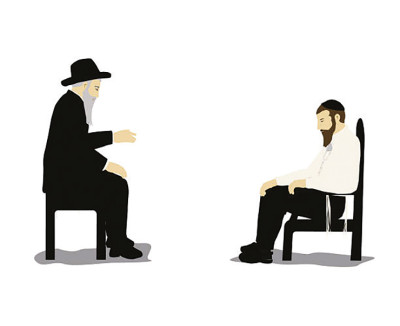

I would like to preface this article with a summary of what I have written thus far. Idolatry today, as narrowly as I can pinpoint it, is the sacrificing of one’s Ultimate Divine Self in favor of one’s vice, a ubiquitous human struggle.
This “is essentially self-deception, imagination, projection, and superstition” (Judaism Demystified podcast). Ages ago, people were guilty of this by sacrificing their flesh and blood to gain control of this world, irrespective of the breadth of control desired. Nowadays, we do not sacrifice our flesh and blood but our mind, soul, and virtue to the idol that is our vice. Please do not assume I write this as though I am on a mountaintop, gazing at the sins of the nation. I write about this topic because of how cognizant I am of this problem. This is a task much easier to write about than to undertake. The modern struggle of idolatry - to attempt not to justify our immorality through self-deception but rather take responsibility for becoming our Ultimate Divine Selves - is a lifelong battle. I only hope that these articles will serve as a means of cognizance of this problem and will assist in finding avenues to overcome it.
Truth be told, it would be simple to provide proof of this hidden idolatrous reality through politics. No matter what side of the aisle, all are prone to some way of thinking about policy whose outcome will leave victors and vanquished. However, I will purposely refrain from this volatile arena as I do not wish to cause unnecessary political debate that would be beside the point. What I will turn to in this article are a few small anecdotal accounts of people giving into their vices. For a more comprehensive overview of stories of this kind, I would like to direct the reader’s attention to a book written by a world-renowned Psychiatrist, M. Scott Peck, People of the Lie. In this religious and psychological recapture of encounters Peck had with his patients, he demonstrates the seemingly “innocent behaviors” people engage in that are in reality evil. These types of evils are the mask modern day idolatry wears. One example of this in his book is the case of an outwardly charismatic man, creatively dubbed “Joe Cool,” who was very successful in business and life. Unbeknownst to Joe Cool was the fact that he was repressing many personal and marital problems. So much so that he was completely unaware that he had them. This repression caused him to hear voices in his head shouting portents of his immediate death while driving, which is why he started seeing Peck in the first place. Peck attempted to advise him, but Joe was mostly reluctant. And the voices kept reappearing. So much did these voices bother him that he drove back to where he had heard them on the road in an attempt to quiet them and prove he would not die. But to no avail. The only thing that worked for Joe was a self-proclaimed “pact with the devil” that the next time Joe gave into his obsession to drive back to the site of the voices, the devil could have his son. Ironically, Joe did not believe in the devil, but the voices stopped. The “pact” worked!
If we pause and reflect on what just happened, we will realize that the most appropriate description of this “pact with the devil” is worshipping an idol. Joe, simply for the sake of his “peace of mind”, mentally sacrificed his son! This is an undistorted modern echo of the physical sacrifice of one’s son to Molekh of yore. We may be tempted to assume that a mental sacrifice is less problematic than an actual one, but that would be dishonest. That would simply be comparing the severity of evils irrespective of the moral evolutionary zeitgeist of mankind. When one factors this in, mental actions of this measure are arguably as evil as their physical counterparts from millennia ago, although they seem more innocent. After all, Joe had no “real victims.” Or so it would seem.
In this case Joe believed he got away with his pact and did not technically do anything wrong. But he came back to Peck because he was feeling “the guilties.” Peck was glad that Joe was feeling guilt, but he had no intention of healing Joe’s remorse since what he did was evil,
and Peck was shocked Joe did not realize that himself. Joe became a victim of his own idol worship. He rationalized his evil instead of taking Peck’s advice and assuming responsibility for his actions. For Joe, selling his son to the devil was easier than taking responsibility for fixing his life. After all, idolatry is always more convenient than the effort required to become one’s Ultimate Divine Self.
Now to move on to a story closer to home, one that I have personally witnessed while living in Queens, which showcases sacrificing one’s Ultimate Divine Self in favor of one’s vices. Once, at an arvit minyan on a regular weekday, there were two mourners who came in, brothers, that had lost their parent recently. As is the custom, low stools were set for them, and they said the kaddish at the end of arvit. It was at this point that it was evident to all that they were not Observant, as kaddish took a rather long time. The impatience was felt by all. I felt sorry for the brothers, who were simply trying to honor their parent. At the end of the final kaddish, most men scurried out without acknowledging the brothers. That was bad enough. But then, one man, let’s call him “Ploni,” came over to these brothers and scolded them for taking so long. Of course, he scolded them in a coolheaded voice so he could tell himself he was just “rebuking his fellow Jew” as the Torah commands. Or at least to preemptively reduce his “guilties.” Idols do cause delusion, to paraphrase Zechariah (10:2). We can see that Ploni acted in a manner tantamount to idol worship by worshipping his own interests in favor of the ethical. He was so self-absorbed that the Divine imperative to show compassion and respect completely eluded him. Self-absorption > consolation of avlei Zion according to his idol. According to Hashem? Clearly not so. I can only hope this interaction did not hinder the mourners from cleaving to Hashem. I fear that is too naïve.
My dear brothers and sisters, I do not write this with any misguided wish to cause us to focus on the errors others make. This is a burden I do not wish for anyone. I pray I was less prone to it. However, I have tried to use this awareness to gaze inward and have become extremely aware of my vices. It is difficult but necessary for all, Jews especially, to become our ultimate Divine selves. To smash our vices, our modern idols. I only hope through this cognizance, we can improve ourselves with a courage we never knew we possessed, to become a version of ourselves we never thought achievable. With luck and good wishes on this journey, Amen.
Dovidchai Abramchayev graduated with a BS in accounting from Lander College for men. He is pursuing a CPA and works in the NFP audit industry. In his spare time, Abramchayev learns Torah, philosophy, and theology.
Idolatry – An Anecdotal Case Study
Typography
- Smaller Small Medium Big Bigger
- Default Helvetica Segoe Georgia Times
- Reading Mode




